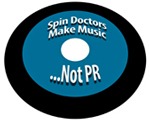Spin Doctors Make Music, Not PR
Posted At: October 21, 2009 1:21 PM
by Jessica Boyd
 When you hear the words “spin doctor,” what image comes to mind? If you see the popular 90s music group The Spin Doctors, think again. Most people think about only one group of people: public relations professionals.
When you hear the words “spin doctor,” what image comes to mind? If you see the popular 90s music group The Spin Doctors, think again. Most people think about only one group of people: public relations professionals.
“Spin doctor” has almost become a synonym for “public relations professional.” The American public sees public relations as a way for its practitioners to spin the truth in order to boost their clients’ public image.
In a review for the book PR: A Persuasive Industry? Spin, Public Relations and the Shaping of the Modern Media, author Seth Brown said, “People tend to think that PR involves being manipulative and saying whatever is in the employer’s best interests.” He said the authors of the book view public relations as “amoral, a tool for good and evil purposes.”
Gini Dietrich, CEO of Arment Dietrich Inc. and author of “The Fight Against Destructive Spin” blog, gave her own definition of spin in the public relations world. She said, “People always refer to PR professionals as spin doctors, meaning they can take a client’s business and turn it into a newsworthy story that a reporter would want to write about, even if it means not telling the full truth.” According to Dietrich, public relations professionals are often lumped in with professions, such as used car salesmen, “because people believe we lie to tell our clients’ story.”
PR professionals are believed to spin the facts in a positive way in order to make headlines and gain press for their clients. Sometimes the “spin” is a simple omission of facts, but public relations professionals have been known to blatantly lie to protect their clients’ image.
“I did not have sexual relations with that woman.” Nine words ultimately defined former President Bill Clinton’s presidency and created one of the most complicated public relations crises in American history. President Clinton and his press squad continued to lie about the president’s infamous affair with his intern until the facts could no longer be ignored. The former president eventually came clean, but it was virtually forced after incriminating facts surfaced. Because of bad PR practices, Clinton’s public image has been forever tarnished.
Spin has a negative connotation, especially in the public relations field. But is spin always a negative practice?
Mike Cohen, executive vice president of Ackermann PR, has a somewhat different definition of spin doctor that removes the negative connotation. He said spin is simply trying to present the clients’ story and facts in the best way possible without lying. According to Cohen, honest spin in public relations is no different than a child explaining how he accidentally broke a vase: both the professional and the child present the facts in a way that will alleviate as much blame and criticism as possible.
Although he believes spin can be positive, Cohen also acknowledges unethical spinning practices. He said, “All we do is try and put a good face on facts. Now if anyone tries to make a bad thing sound like it’s really good — well, that can be a problem.”
Even if “good spin” does exist, public relations practitioners must continue to combat the lying associated with negative spin. This may seem like a daunting task, but there are some simple solutions to keep spin ethical and beneficial for clients.
Gini Dietrich combats negative spin through her blog “The Fight Against Destructive Spin.” She explained that public relations practitioners should be firm with clients. She said, “It’s even more important to tell the truth and never lie, even if it means conflict or uncomfortable situations.” Dietrich maintained that the best policy for addressing the spin doctor label is honesty. She said, “If we all remember that it’s our job to tell the truth, not to do everything the client asks, eventually the label will go away.”
People may define spin in different ways, either positively or negatively, but most will agree on one thing: honesty is the best policy when addressing a client’s needs. If this policy is upheld, “spin doctor” and its negative connotation could be erased from PR vocabulary. Maybe then The Spin Doctors would no longer be confused with people who doctor dishonest behavior.
Graphic by Niki Gautier


